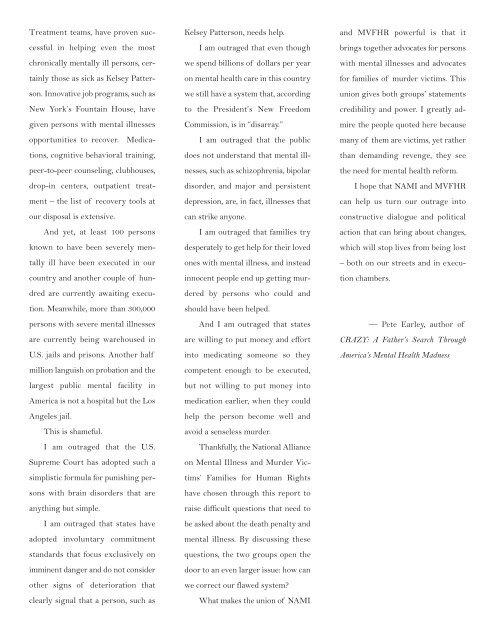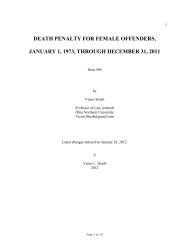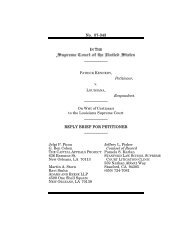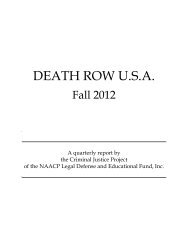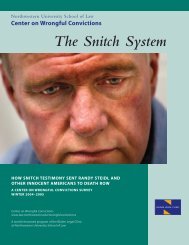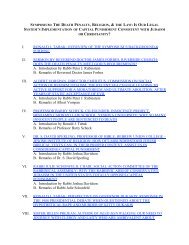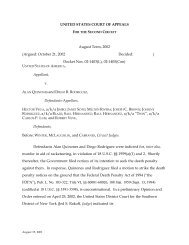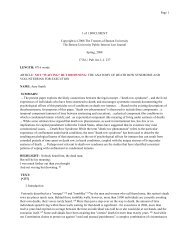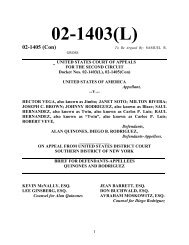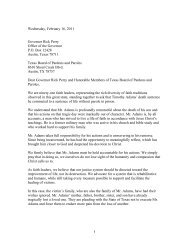Double Tragedies - Families for Human Rights
Double Tragedies - Families for Human Rights
Double Tragedies - Families for Human Rights
- No tags were found...
Create successful ePaper yourself
Turn your PDF publications into a flip-book with our unique Google optimized e-Paper software.
Treatment teams, have proven successfulin helping even the mostchronically mentally ill persons, certainlythose as sick as Kelsey Patterson.Innovative job programs, such asNew York’s Fountain House, havegiven persons with mental illnessesopportunities to recover. Medications,cognitive behavioral training,peer-to-peer counseling, clubhouses,drop-in centers, outpatient treatment– the list of recovery tools atour disposal is extensive.And yet, at least 100 personsknown to have been severely mentallyill have been executed in ourcountry and another couple of hundredare currently awaiting execution.Meanwhile, more than 300,000persons with severe mental illnessesare currently being warehoused inU.S. jails and prisons. Another halfmillion languish on probation and thelargest public mental facility inAmerica is not a hospital but the LosAngeles jail.This is shameful.I am outraged that the U.S.Supreme Court has adopted such asimplistic <strong>for</strong>mula <strong>for</strong> punishing personswith brain disorders that areanything but simple.I am outraged that states haveadopted involuntary commitmentstandards that focus exclusively onimminent danger and do not considerother signs of deterioration thatclearly signal that a person, such asKelsey Patterson, needs help.I am outraged that even thoughwe spend billions of dollars per yearon mental health care in this countrywe still have a system that, accordingto the President’s New FreedomCommission, is in “disarray.”I am outraged that the publicdoes not understand that mental illnesses,such as schizophrenia, bipolardisorder, and major and persistentdepression, are, in fact, illnesses thatcan strike anyone.I am outraged that families trydesperately to get help <strong>for</strong> their lovedones with mental illness, and insteadinnocent people end up getting murderedby persons who could andshould have been helped.And I am outraged that statesare willing to put money and ef<strong>for</strong>tinto medicating someone so theycompetent enough to be executed,but not willing to put money intomedication earlier, when they couldhelp the person become well andavoid a senseless murder.Thankfully, the National Allianceon Mental Illness and Murder Victims’<strong>Families</strong> <strong>for</strong> <strong>Human</strong> <strong>Rights</strong>have chosen through this report toraise difficult questions that need tobe asked about the death penalty andmental illness. By discussing thesequestions, the two groups open thedoor to an even larger issue: how canwe correct our flawed system?What makes the union of NAMIand MVFHR powerful is that itbrings together advocates <strong>for</strong> personswith mental illnesses and advocates<strong>for</strong> families of murder victims. Thisunion gives both groups’ statementscredibility and power. I greatly admirethe people quoted here becausemany of them are victims, yet ratherthan demanding revenge, they seethe need <strong>for</strong> mental health re<strong>for</strong>m.I hope that NAMI and MVFHRcan help us turn our outrage intoconstructive dialogue and politicalaction that can bring about changes,which will stop lives from being lost– both on our streets and in executionchambers.— Pete Earley, author ofCRAZY: A Father’s Search ThroughAmerica’s Mental Health Madness


